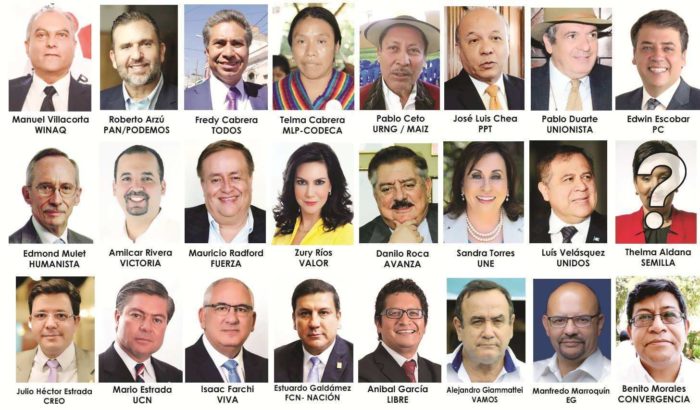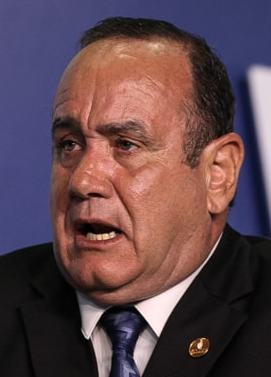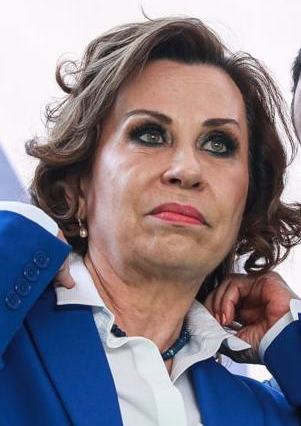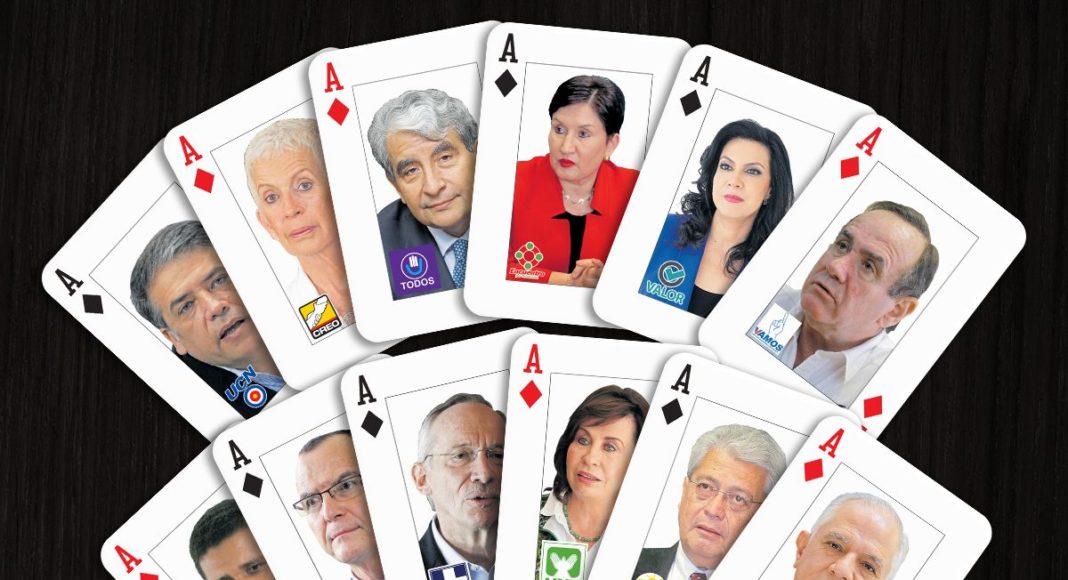Written by Nathalie Mercier, Christian Aid’s Programme Officer in Guatemala
Decision day is fast approaching for Guatemalans awaiting the result of the country’s presidential elections.
Neither of the two front-running candidates – Sandra Torres from the centre party National Union for Hope (UNE), and Alejandro Giammattei from the far-right party Vamos – achieved the majority needed for victory in the first round (in June). Torres received 26% of the vote, and Giammattei 14%.

A growing trend in the country’s elections in recent years, is the high number of parties that participate. This year, 19 parties ran presidential candidates. Also notable is that many parties have little or no track record, with new parties forming and others dissolving in each election period. These issues – combined with the fact that many parties do not present formal manifestos and those that are presented are often deficient and lack fiscal rigour or concrete means to achieve the 2030 Sustainable Development Goals – result in candidates often relying on demagogic discourse and clientelism – where political parties have rewarded their supporters in exchange for votes.
Nonetheless, familiar faces do reappear in each election campaign, albeit under different banners. Giammattei and Torres are two such familiar faces.
Vamos’ Giammattei: new party, fourth time lucky?

This is Giammattei’s fourth presidential election campaign, even though his current party, Vamos, was only formed in 2017. The closest he has come to succeeding in the run-off vote (2nd round) was in 2007 when he came third with 17.3 per cent. His popularity at that time was down to his role as director of the state penitentiary system, during which he oversaw the alleged ‘return to order’ – a reaction o a large-scale riot in the country’s biggest prison, Granja Penal Pavón. This ‘return to order’ included the extrajudicial execution of seven prisoners.
Giammattei was briefly remanded in custody in 2010 for skipping bail, but charges against him in the case of the extrajudicial executions were dropped in 2011. According to both El Periódico and Nómada, Giammattei has close links with underground ex-military networks and members of the business elite: “financiers and shady characters”, according to Nómada.
According to the Central American Institute for Fiscal Studies (ICEFI), Giammattei’s party manifesto can be characterised by its market focus, with a subsidiary State that outsources services. Although Vamos’ manifesto recognises inequality based on social class, ethnicity and age, it fails to identify the issue of gender inequality.
In a recent public forum, Ana Cevallos from ICEFI indicated that ‘both candidates’ [Giammattei’s and Torres’] promises include measures which unavoidably relate to public spending, but there is little hope that these promises will be kept, because they are not based on technical analysis… What’s more, these measures do not guarantee a real commitment to an egalitarian society, as they do not consider the extent of inequality in Guatemala.’
This year’s election comes at a time when Guatemala, normally relatively absent in the international media, has been gaining considerable coverage, due to a controversial “Safe Third Country” agreement with the Trump administration. The widely criticised agreement aims to reduce immigration in the US by granting refuge in Guatemala while US asylum applications are processed. Many have pointed out the irony in designating as a ‘safe country’ one which fails to guarantee the safety of its own citizens, having a homicide rate more than double that considered by the OMS as ‘endemic’ and some 60% of the population living in poverty or extreme poverty -.
Current president Jimmy Morales began negotiations with the White House earlier this year, only to later withdraw. However, in a series of tweets from Trump, the president then threatened Guatemala with tariffs and taxes on remittances (which form a considerable part of the Guatemalan economy) if it did not concede. Just days later, the agreement was signed.
Intolerance to the fore
Furthermore, this year’s elections, like those in previous years, have created a propitious environment for a far-right discourse of intolerance. Both Giammattei and Torres have signed commitments to support a controversial bill currently being pushed through Congress, the Protection of Life and the Family Law. The preamble of the bill attacks minority groups who, ‘… following an international agenda, are proposing ways of thinking and practices that are incongruent with Christian morals and they promote behaviour that goes against the right to life, the natural order of matrimony and the family.’ The bill then adopts somewhat belligerent language, referring to the need to legislate to protect Guatemalans ‘from any action which would represent a threat to the balance of our society and a danger for peace and peaceful coexistence…’.
Also, currently under scrutiny in Congress, in an ever-deteriorating human rights context, is a bill which proposes to reform the National Reconciliation Law. It would mean a blanket amnesty, including for crimes that are currently excluded, such as genocide, torture, forced disappearance and other crimes for which the statute of limitations does not apply.
Impunity and CICIG
When human rights organizations took out an injunction to halt this, the Constitutional Court (Guatemala’s highest authority) issued a resolution on 18 July that the bill should be suspended. However, Congress responded by presenting a complaint against the Constitutional Court judges involved. According to a recent communiqué published by ex-chancellors and ambassadors, legal action against the judges would put the Rule of Law in serious jeopardy by undermining the vital principles of the separation of powers and judicial independence.
Morales’ administration has also been widely criticised for its attacks against the International Commission Against Impunity (CICIG). Giammattei’s party has maintained an absolute silence on the issue. This could put in jeopardy the future of anti-corruption efforts in Guatemala.
UNE’s Sandra Torres

Sandra Torres is the ex-wife of former president Álvaro Colom (2008-2012). The independent newspaper, Nómada, dates the phenomenon of ‘Sandrofobía’ to the period of Colom’s presidency in particular, when she took an active role in the coordination of social programmes, a break from the usual, more passive role of the first lady. Many analysts consider her an opportunist, who used her social programmes to garner political support for a future presidential campaign. She tried to run for the presidency in 2011 but her candidacy was denied due to her marriage to Colom. The couple then announced their divorce, but Torres was still denied candidacy.
Torres’ party is under investigation for illegal funding of the 2015 campaign. She has also been criticised during her current campaign for her use of legislation to reduce violence against women to try to limit negative press coverage of her.
According to the Central American Institute for Fiscal Studies (ICEFI), UNE’s manifesto maintains a rights-based focus, with the State as an active player in social wellbeing, and a guarantor of equality and universality, however its fiscal plans are not sufficiently watertight to follow through.
Torres’ party’s stand on the issue has been ambiguous, and Torres could find herself on trial in the future if she allows the work of CICIG to continue. However, if the CICIG’s mandate is not renewed, it would put in jeopardy the future of anti-corruption efforts in Guatemala.
Civil society beware
Neither candidate inspires confidence that, if elected, they would address the issues that face most Guatemalans . If Torres is elected there is serious concern as to whether she will take the necessary action to combat corruption and impunity, and to tackle deep-routed inequality, or whether her administration will mark a continuation of the current political status quo.
If Giammattei is elected, given his entourage, chequered history, and public statements during his campaign, it remains to be seen whether he can make improvements in the current political context. Either way, civil society will need to respond.


